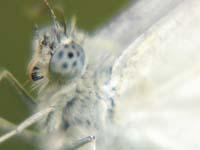Thanks to the eyes of Sitsen, more efficient solar panels

Dutch researchers have developed an anti-reflective layer based on the nanostructure of moth eyes to reduce the reflection of photovoltaic cells and thus create more efficient panels. In fact, today much of the light that reaches photovoltaic cells is reflected and not transformed into energy.
The eyes of the moths have several nanostructures that allow progressively increasing the refractive index of light when moving from the air to the eyes of the moths. Therefore, the eyes reflect very little light.
In fact, the structures on which researchers have relied have prevented this effect on nanofabrics of different lengths. A metamaterial composed of gallium phosphates has been developed that has measured the light that reflects and transmits this material. They want the amount of reflected light to be further reduced in the future.





